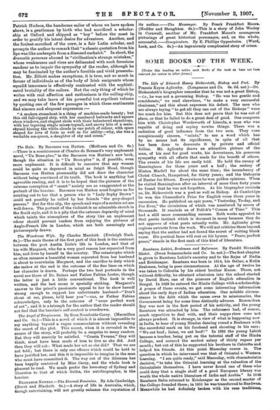SONIE BOOKS OF THE WEEK.
[Under this heading we notice such Books of the week as have not Nen reserved for review in other formal
The Life of Edward Henry Bickersteth, Bishop and Poet. By Francis Keyes Aglionby. (Longmans and Co. 6s. fid. net.)—Dr. Bickersteth's biographer concedes that he was not a great Bishop,. —i.e., he was not a governing Bishop. "He was too gentle and. considerate," we read elsewhere, "to make a very successful chairman," and this about expresses his defect. The men who are always trying "to get all they can out of the Bishops" were- too much for him. But this does not prove that he was out of place, or that he failed to do a great deal of good. One compares him with Christopher Wordsworth of Lincoln, a man who was. capable of doing and saying unwise things. There was a_ radiation of good influence from the two men. They were conspicuously sincere, "saints," to use a word which has. byno means lost its significance, in spite of all that, has been done to desecrate it by private and official follies. Mr. Aglionby draws an attractive picture of tho man, of his zeal for good works, his devoutness, his generous. sympathywith all efforts that made for the benefit of others. The events of his life are easily told. He held the curacy of Banningham for three years and a half ; the rectory of - Hinton Marfell for about the same time ; the incumbency of- Christ Church, Hampstead, for thirty years ; and the bishopric- of Exeter for fifteen. Everywhere he won golden opinions. When he visited Banningliam after an interval of more than forty years. hefound that he was not forgotten. As his biographer reminds us, Dr. Bickersteth was a poet as well as Bishop. At Cambridge, he won the Chancellor's Prize for English verse three years in succession. Ho published an epic poem, "Yesterday, To-day, and_ For Ever," the circulation of which was numbered by scores of thousands. It reminds us of Pollok's "Course of Time." This had a still more commanding success. Both works appealed to that poetic instinct which is dormant in many because they do- not approve of what poets actually write. Mr. Aglionby gives copious extracts from the work. We will not criticise them beyond.. saying that the author had not found the secret of writing blank verse. His poetical fame will rest on his hymns. "Peace, perfect- peace," stands in the first rank of this kind of literature.






























































 Previous page
Previous page